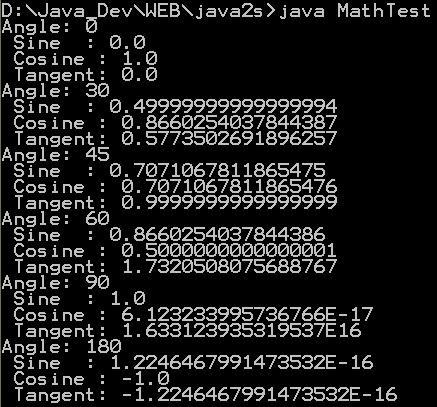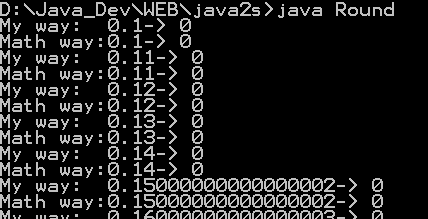Returns the least common multiple between two integer values.
import java.io.File;
/*
* Licensed to the Apache Software Foundation (ASF) under one or more
* contributor license agreements. See the NOTICE file distributed with
* this work for additional information regarding copyright ownership.
* The ASF licenses this file to You under the Apache License, Version 2.0
* (the "License"); you may not use this file except in compliance with
* the License. You may obtain a copy of the License at
*
* http://www.apache.org/licenses/LICENSE-2.0
*
* Unless required by applicable law or agreed to in writing, software
* distributed under the License is distributed on an "AS IS" BASIS,
* WITHOUT WARRANTIES OR CONDITIONS OF ANY KIND, either express or implied.
* See the License for the specific language governing permissions and
* limitations under the License.
*
*
*/
public class Main {
/**
* Returns the least common multiple between two integer values.
*
* @param a the first integer value.
* @param b the second integer value.
* @return the least common multiple between a and b.
* @throws ArithmeticException if the lcm is too large to store as an int
* @since 1.1
*/
public static int lcm(int a, int b) {
return Math.abs(mulAndCheck(a / gcd(a, b), b));
}
/**
* Multiply two integers, checking for overflow.
*
* @param x a factor
* @param y a factor
* @return the product <code>x*y</code>
* @throws ArithmeticException if the result can not be represented as an
* int
* @since 1.1
*/
public static int mulAndCheck(int x, int y) {
long m = ((long)x) * ((long)y);
if (m < Integer.MIN_VALUE || m > Integer.MAX_VALUE) {
throw new ArithmeticException("overflow: mul");
}
return (int)m;
}
/**
* <p>
* Gets the greatest common divisor of the absolute value of two numbers,
* using the "binary gcd" method which avoids division and modulo
* operations. See Knuth 4.5.2 algorithm B. This algorithm is due to Josef
* Stein (1961).
* </p>
*
* @param u a non-zero number
* @param v a non-zero number
* @return the greatest common divisor, never zero
* @since 1.1
*/
public static int gcd(int u, int v) {
if (u * v == 0) {
return (Math.abs(u) + Math.abs(v));
}
// keep u and v negative, as negative integers range down to
// -2^31, while positive numbers can only be as large as 2^31-1
// (i.e. we can't necessarily negate a negative number without
// overflow)
/* assert u!=0 && v!=0; */
if (u > 0) {
u = -u;
} // make u negative
if (v > 0) {
v = -v;
} // make v negative
// B1. [Find power of 2]
int k = 0;
while ((u & 1) == 0 && (v & 1) == 0 && k < 31) { // while u and v are
// both even...
u /= 2;
v /= 2;
k++; // cast out twos.
}
if (k == 31) {
throw new ArithmeticException("overflow: gcd is 2^31");
}
// B2. Initialize: u and v have been divided by 2^k and at least
// one is odd.
int t = ((u & 1) == 1) ? v : -(u / 2)/* B3 */;
// t negative: u was odd, v may be even (t replaces v)
// t positive: u was even, v is odd (t replaces u)
do {
/* assert u<0 && v<0; */
// B4/B3: cast out twos from t.
while ((t & 1) == 0) { // while t is even..
t /= 2; // cast out twos
}
// B5 [reset max(u,v)]
if (t > 0) {
u = -t;
} else {
v = t;
}
// B6/B3. at this point both u and v should be odd.
t = (v - u) / 2;
// |u| larger: t positive (replace u)
// |v| larger: t negative (replace v)
} while (t != 0);
return -u * (1 << k); // gcd is u*2^k
}
}
Related examples in the same category
| 1. | Absolute value | | |
| 2. | Find absolute value of float, int, double and long using Math.abs | | |
| 3. | Find ceiling value of a number using Math.ceil | | |
| 4. | Find exponential value of a number using Math.exp | | |
| 5. | Find floor value of a number using Math.floor | | |
| 6. | Find minimum of two numbers using Math.min | | |
| 7. | Find power using Math.pow | | |
| 8. | Find square root of a number using Math.sqrt | | |
| 9. | Find natural logarithm value of a number using Math.log | | |
| 10. | Find maximum of two numbers using Math.max | | |
| 11. | Get the power value | |  |
| 12. | Using the Math Trig Methods | |  |
| 13. | Using BigDecimal for Precision | |  |
| 14. | Demonstrate our own version round() | |  |
| 15. | Demonstrate a few of the Math functions for Trigonometry | |  |
| 16. | Exponential Demo | |  |
| 17. | Min Demo | | |
| 18. | Basic Math Demo | |  |
| 19. | Using strict math in applications | |  |
| 20. | Conversion between polar and rectangular coordinates | | |
| 21. | Using the pow() function | | |
| 22. | Using strict math at the method level | | |
| 23. | Calculating hyperbolic functions | | |
| 24. | Calculating trigonometric functions | | |
| 25. | Weighted floating-point comparisons | | |
| 26. | Solving right triangles | | |
| 27. | Applying the quadratic formula | | |
| 28. | Calculate the floor of the log, base 2 | | |
| 29. | Greatest Common Divisor (GCD) of positive integer numbers | | |
| 30. | Least Common Multiple (LCM) of two strictly positive integer numbers | | |
| 31. | Moving Average | | |
| 32. | Make Exponention | | |
| 33. | Caclulate the factorial of N | | |
| 34. | Trigonometric Demo | |  |
| 35. | Complex Number Demo | | |
| 36. | sqrt(a^2 + b^2) without under/overflow | | |
| 37. | Returns an integer hash code representing the given double array value. | | |
| 38. | Returns an integer hash code representing the given double value. | | |
| 39. | Returns n!. Shorthand for n Factorial, the product of the numbers 1,...,n as a double. | | |
| 40. | Returns n!. Shorthand for n Factorial, the product of the numbers 1,...,n. | | |
| 41. | Returns the hyperbolic sine of x. | | |
| 42. | Contains static definition for matrix math methods. | | |
| 43. | For a double precision value x, this method returns +1.0 if x >= 0 and -1.0 if x < 0. Returns NaN if x is NaN. | | |
| 44. | For a float value x, this method returns +1.0F if x >= 0 and -1.0F if x < 0. Returns NaN if x is NaN. | | |
| 45. | Normalize an angle in a 2&pi wide interval around a center value. | | |
| 46. | Normalizes an angle to a relative angle. | | |
| 47. | Normalizes an angle to an absolute angle | | |
| 48. | Normalizes an angle to be near an absolute angle | | |
| 49. | Returns the natural logarithm of n!. | | |
| 50. | Gets the greatest common divisor of the absolute value of two numbers | | |
| 51. | Matrix manipulation | | |
| 52. | Returns exact (http://mathworld.wolfram.com/BinomialCoefficient.html) Binomial Coefficient | | |
| 53. | Returns a double representation of the (http://mathworld.wolfram.com/BinomialCoefficient.html) Binomial Coefficient | | |
| 54. | Returns the natural log of the (http://mathworld.wolfram.com/BinomialCoefficient.html) Binomial Coefficient | | |
| 55. | Returns the hyperbolic cosine of x. | | |
| 56. | Math Utils | | |
| 57. | Implements the methods which are in the standard J2SE's Math class, but are not in in J2ME's. | | |
| 58. | Utility methods for mathematical problems. | | |
| 59. | A math utility class with static methods. | | |
| 60. | Computes the binomial coefficient "n over k" | | |
| 61. | Log Gamma | | |
| 62. | Log Beta | | |
| 63. | Beta | | |
| 64. | Gamma | | |
| 65. | Factorial | | |
| 66. | Computes p(x;n,p) where x~B(n,p) | | |
| 67. | Returns the sum of two doubles expressed in log space | | |
| 68. | sigmod | | |
| 69. | sigmod rev | | |
| 70. | Numbers that are closer than this are considered equal | | |
| 71. | Returns the KL divergence, K(p1 || p2). | | |
| 72. | Returns the sum of two doubles expressed in log space | | |
| 73. | Returns the difference of two doubles expressed in log space | | |
| 74. | Is Prime | | |
| 75. | Statistical functions on arrays of numbers, namely, the mean, variance, standard deviation, covariance, min and max | | |
| 76. | This class calculates the Factorial of a numbers passed into the program through command line arguments. | |  |
| 77. | Calculates the Greatest Common Divisor of two numbers passed into the program through command line arguments. | | |
| 78. | Variance: the square of the standard deviation. | | |
| 79. | Population Standard Deviation | | |
| 80. | Returns from a static prime table the least prime that is greater than or equal to a specified value. | | |